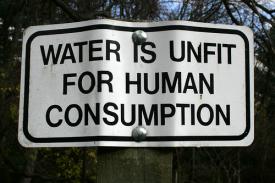On Friday, New Jersey legislators unanimously voted for S-2576, a bill which prohibits hydraulic fracturing (a.k.a. fracking) for natural gas in the state.
S-2576 is largely symbolic since New Jersey does not use fracking to drill for natural gas. This bill does, however, send a clear message to the industry as well as neighbouring states looking to tap into the Marcellus Shale formation which reaches into New York, Pennsylvania, Ohio, West Virginia and northwestern N.J.
In February, New York announced it will lift its 7-month moratorium on fracking in June despite public opposition and nearly two weeks ago, Pennsylvania’s Republican Governor Tom Corbett overturned a de-facto ban on leasing sensitive forest land for shale gas development. Additionally, the New Jersey decision to ban dangerous fracking is timely since the Delaware River Basin Commission (DRBC), an intra-state agency overseeing the health of the Delaware River, is presently drafting regulations to control how and where fracking may proceed in the River’s bordering states.
As the New York Times has revealed, hydraulic fracturing poses a significant risk to water quality, public health and the environment.. The claim that gas is “clean” energy is also challenged by the sizable amounts of global warming pollution, comparable to coal, emitted in the entire life cycle of gas production and consumption.
In a Senate hearing earlier in the week, fracking lobbyists argued that Marcellus Shale offers vast and cheap reserves of natural gas. Ed Waters, Director of government affairs for the Chemistry Industry Council of New Jersey said, “If we don’t have that cheap supply of natural gas, we can’t compete in the global markets.”
Sen. Bob Smith (D-Middlesex), Chairman of the Environment Committee, accepted that natural gas seems on the surface to represent a cheap supply of energy, but countered that:
“New Jersey has 105 superfund toxic waste sites because industry failed to police itself in the past. Don’t you believe we should worry about that with fracking?”
Jeff Tittel, Executive Director of the New Jersey Sierra Club describes fracking as “the biggest threat to New Jersey’s water supply that we’ve ever seen.”
State Senator Bob Gordon (D-Bergen), the bill’s sponsor describes the need and impact for this ban:
“The environmental dangers of this procedure and the risks they would pose to New Jersey residents are abundantly clear. In fact, I believe it poses the greatest risk we have seen to our drinking water in our lifetime. This is something we simply cannot allow to come to our state.”
“By passing this legislation we can prevent this hazardous process from happening in New Jersey before it ever gets started. Moreover, we can set the environmental protection example for all other states in the country.”
With the legislature coming out in favour of protecting state rivers and water supplies, the environment and public health, New Jersey’s Republican Governor Chris Christie should think long and hard before attempting to override the fracking ban.
Subscribe to our newsletter
Stay up to date with DeSmog news and alerts






